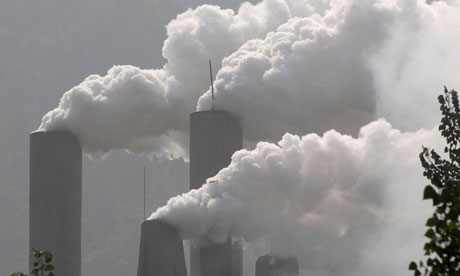European companies 'using emissions trading to subsidise overseas rivals'
Report reveals steel and cement giants are buying cheap carbon credits abroad in order to avoid cutting their own emissions

Smoke rises from a cement plant in Hubei province, China. Some of Europe’s biggest emitters have bought cheap credits from developing or eastern European countries. Photograph: Reuters
Some of the companies that have complained loudest about theEuropean Union's environmental measures are using the EU's emissions trading scheme (ETS) to give money to rivals in other countries instead of cutting their own greenhouse gas emissions, it has emerged.
A report by Sandbag, a non-governmental organisation that examines carbon trading, found that some of the biggest steel and cement companies in the EU have been buying cheap carbon credits from steel makers in developing and eastern European countries as a way of reducing their need to cut or pay for emissions under the EU's emissions trading scheme. This effectively means they have been subsidising overseas rivals.
Baroness Bryony Worthington, founder of Sandbag, said: "A close look at the use of offsetting reveals that the steel sector is making great use of international offsets – to cover 45% of its emissions in 2011 … The fact that they are voluntarily sending money to rivals rather undermines their claims that their top concern about the ETS is its damage to their international competitiveness. It is clear from their use of offsetting that they know how to use the scheme to turn a profit and that their competitiveness complaints are overblown."
Many of the same companies have been vocal in their complaints, or involved in behind-the-scenes lobbying to water down the emissions trading scheme, under which they have to pay for their emissions or buy carbon "offsets". These are carbon credits issued to developments overseas that reduce greenhouse gas emissions.
However, these credits vary in quality and some may offer less carbon reduction than first appears. There is now such a glut of them on the market that their price is very low – in some cases less than €1 per credit, which is supposed to represent a tonne of carbon saved. This means there is little financial incentive for EU-based companies to cut emissions, by increasing efficiency or investing in technology such as renewable energy.
Some of Europe's biggest emitters have bought cheap credits from their own sector, which means paying overseas rivals to cut their emissions. ThyssenKrupp was the biggest buyer of overseas credits in the steel sector, acquiring more than half a million in the past four years. ArcelorMittal followed close behind with more than 460,000 purchases.Tata Steel has bought nearly 72,000 carbon offsets from steel projects. In the cement sector, France's Lafarge bought more than 180,000 supplementary credits last year.
Rob Elsworth, policy officer at Sandbag, said: "Offsetting was supposed to be a price containment measure to ensure that carbon prices didn't rise too high, but carbon prices have remained low due to excess supply in the market. Offsets are contributing significantly to this oversupply and are now depressing prices so low that the EU ETS almost ceases to have a function."
There has been a frenzy of buying cheap carbon credits in recent months, by companies covered by the EU's emissions trading scheme. That is because some of the very cheapest come from companies – mostly sited in China or other rapidly emerging economies – that install cheap equipment to cut their emissions of certain industrial gases. As these gases are many times more potent in warming the atmosphere than carbon dioxide, companies can receive tens of millions of carbon credits for an outlay of just a few million dollars or less on the scrubbing equipment.
But these projects have become highly controversial because of allegations that factories that would otherwise have been closed have been kept open and in some cases ramped up production of the greenhouse gases, because they gain so many carbon credits for doing so. For these reasons, the EU has decided to stop accepting credits from these sources from next year, prompting companies to stock up on them now while they are still allowed.
Elsworth said: "Europe can afford to be much more selective in the offsets it allows and must now increase its climate ambition."
By buying cheap credits from overseas, EU companies have helped to vastly reduce the price of carbon within the EU. Another factor has been an overgenerous number of EU carbon permits issued to companies that needed fewer after the financial crisis and European crisis. Some companies have argued that the latter was only fair, as their expected emissions were much lower. But last year about 13% of Europe's emissions were covered by cheap credits from abroad. These credits were only ever meant to be a "safety valve" that companies could purchase if carbon permits within the EU's scheme rose to a very high price. With prices as low as €7 this year for permits issued by the EU, the scheme is having very little effect on companies' behaviour.
Sandbag urged the EU to put more restrictions on buying in carbon credits, and to put in place tougher carbon targets for its own member states.
No hay comentarios:
Publicar un comentario